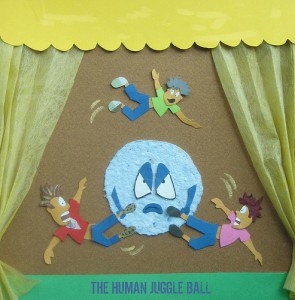
I know multitasking’s been considered one of the most desirable talents in the past. I’m not sure I agree, but that’s another blog post. I have to admit I was surprised to read in the Journal of Personality and Social Psychology that the number of goals a person typically juggles at once is 15! That can’t be good. As I said, I won’t touch the pros and cons with a 10-foot pole right now. I did find some interesting things about dealing with the stress or mental clutter that comes with daily multitasking and demands. Whether you’ve got job-search balls in the air, or just day-to-day juggling, perhaps these tips will help when you want to scream, “Enough!”
I have learned a lot from my clients. I’m still learning. These discoveries came from three of them; names changed of course. And research backs up their stories. How cool is that?
Surprise perks with helping others
Did you know that if your husband has a stressful day looking for work, doing his job work or doing whatever else he was doing that day, offering support can calm both him and you? Tanya shared this one with me. It was actually something she and her colleagues discovered in neuroscience research at a leading national university. They found that women who held their significant other’s arm as he got painful electrical shocks experienced a surge of activity in the brain’s pleasure center – and reduced activity in the brain area that governs fear. Fascinating! “And a bonus,” she told me, “was that providing support made the women feel closer to their partner.”
Peer advice power
Todd had an upcoming interview for a job he wanted badly. “This is the one,” he told me. He prepared through coaching and research. He was as ready as he could be. In fact, he was obsessed and ran the risk of over preparing. So, he was pleasantly surprised and delighted when he found an additional and valuable preparation: a strategy to ease his jitters. What? He chatted with a good friend who had just been through a similar interview situation. After Todd shared how much it helped, I was intrigued. I did a little digging and found that researchers at Harvard University found that subjects who were preparing for interviews or peer evaluations of some type, cut errors in predicting their own emotional responses to the event by 63% after hearing how a friend or someone in their social network did. It seems that getting a friend’s insights can help you foresee curveballs, so you’re better prepared when problems do come up.
Quick cure for mind mess
Brenda was working in a toxic environment where people did not know who was next on the chopping block, or who would offend the decision-makers who quite frankly, were not very nice folks. One day, Brenda was trying to facilitate a leadership meeting, field questions and give a presentation. At one point, the COO made a rude remark to Brenda that made her want to go through the roof. To quit right then and there. Here’s what she did instead. She quietly excused herself, and walked into the next room, a quiet unoccupied office. In about five minutes, she was able to gather her thoughts, compose herself, and return to the original meeting with the COO and others. Again, interesting science base. Researchers at Notre Dame discovered that walking through a doorway made subjects three times less likely to recall memories formed in the room they’d just left. An entryway serves as an event boundary that separates episodes of activity and files them away. They call it the “doorway effect”. It gives you a fresh start.
We all juggle. What to make for dinner. Car needs fixing. A test. Quality time with family. Work demands. Dirty house. To-dos being pushed to the back burner for too long. It’s good to know that there are things we can catalog away in our brains (or computer / notebook if you have a memory like mine) that can really, truly help us move through whatever life is throwing at us!
Photo: nimbu

